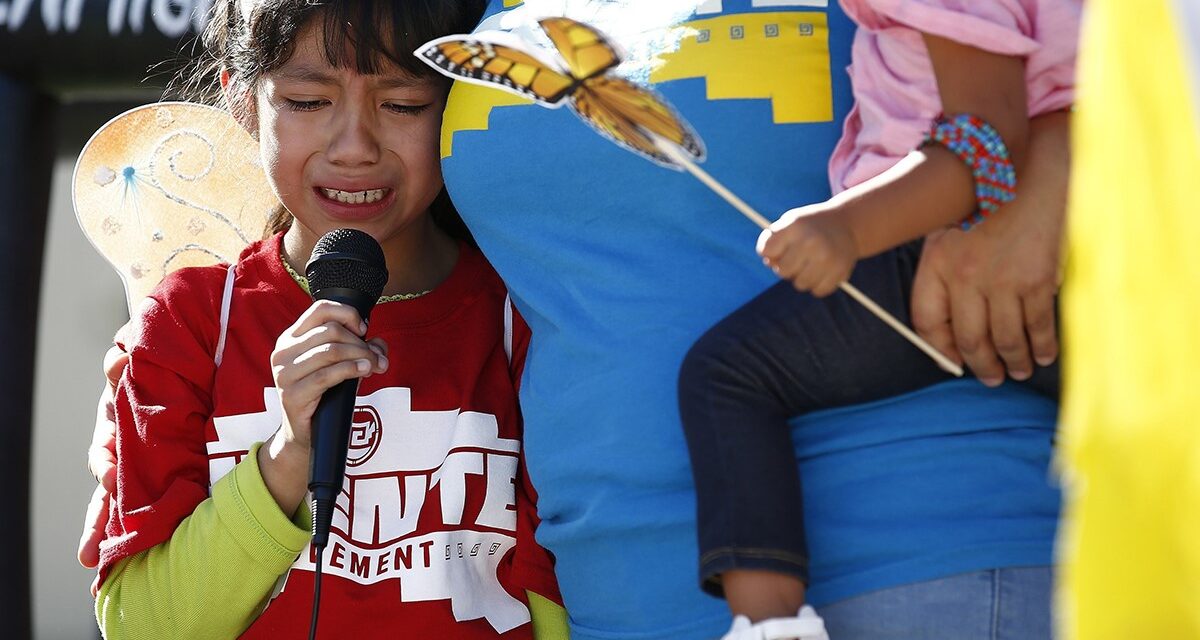
Thousands gathered in Washington, DC on Saturday, June 30, to protest the Trump Administration’s immigration policies. Photo: Danny R. Johnson/San Diego County News
By Danny R. Johnson – National News Correspondent
WASHINGTON, DC – The mass protest rallies held across the country on Saturday, June 30, protesting the Trump administration’s harsh immigration policies is an indication that we live in a nation of restless and discontented Americans, which points to a hot and confrontational summer ahead. Add to the mix the retirement of Justice Anthony Kennedy and a pending vacancy on the U.S. Supreme Court and the recent Supreme Court rulings which were not in favor of the left and the Democratic Party agenda and constituents, you have a recipe that surely will test the nerves and endurance level of people of all political stripes.
More Americans citizens are taking to the streets to voice their discontent in ways which they never imagined. His Salvadoran mother had raised him to abide by the law. She told him that he was crazy to go. But there was Renardlo Solanao, carrying a picket sign that read “Whose Family is Next” in front of the White House with 50 other protesters from all walks of life. A naturalized citizen from Chicago, Solanao had never risked arrest as an activist, but this past month — horrified by the stories and images from the border —he’d felt especially angry and powerless. The moment, he realized, called for an escalation.

Akemi Vargas, 8, spoke to the crowd in tears because her father is being detained and she does not know where he is in the government’s mass immigrants detention system. Photo: Danny R. Johnson/San Diego County News
As Solanao, 26, walked in front of the White House watching DC Secret Service and DC police officers watching their every move closer, he could not believe he was actually demonstrating.
And so we find ourselves at this junction. The start of a hot summer of discontent in the nation’s capital. For those thousands who braved the hot 100 degrees was not a deterrent from protesting what they perceive is a president violating norm after norm. Immigrant children hollering and crying for their mothers and fathers. A Supreme Court seat, open like a wound. A midterm election hurtling toward us like a speedy race car, or a comet from deep space. The resistance girding for war, or curdling into hysteria, depending on your view.
Americans are doing things they would not normally do.
“We are now at a point of desperation,” says DC activist Amy Wright, a D.C. resident. “We’ve been too quiet and have listened to endless debates, and all we’ve seen is the obliteration of the rule of law in this country.” Two weeks ago, Wright got a text message while on the way to work: “Demonstrations to take place in DC – We need organizers.”
In a moment’s notice, Wright was able to round up a posse of activists to heed the call to action, and within 30 minutes after receiving the text – she had confirmed along with 200 others to be at the demonstrations. “I think now is the time to start seeking out and invading the spaces of those officials who are participants in separating mothers from their children,” Wright said of government officials, “so they have to cope with what they’re doing.”
Over the past month — particularly since ProPublica released the audio of children at the border — America has confronted itself in off-hours spaces, in places reserved for politeness and deference.

Demonstrators protested in front of the Trump Hotel demanding that the government cease its policies of separating immigrant families. Photo: Danny R. Johnson/San Diego County News
Inside restaurants at dinnertime. Outside private homes on quiet streets. In office hallways as people are trying to work. Warning signs have become alarm bells, and some people are trying to be academic about it, by debating social graces in careful tones.
To members of the resistance, though, the mistakes of the past are what they’re trying not to repeat. A moral urgency is compelling a sharpening of activism tactics, to satisfy the political dictum “never again.” Inspired by the MXDC confrontation, Jesse Rabinowitz helped organize a small demonstration last week outside the D.C. condo building of Stephen Miller, the Trump adviser behind the hard-line immigration policies. They knew that Miller was in South Carolina with the president. Didn’t matter. Rabinowitz wanted to remind Miller’s neighbors that they’re living next to “a dangerous man,” that they have a “moral obligation” to confront him.
In D.C., “we don’t have political representation but we do have proximity to people in power,” Rabinowitz said. We’re in “a moment of moral clarity where this is what you have to do.”
They came from all over, took planes and buses from 47 states, slept at friends’ homes or in churches and prepared to be arrested this past Thursday, June 28, in Washington. Most of the participants were white women, stumbling over the syllables of Spanish-language chants. Many had never faced arrest before. But here they were.
Capitol Police said 575 protesters were arrested and escorted out of the Hart Senate Office Building in a mass demonstration that called for the abolishment of the U.S. Immigration and Customs Enforcement agency, and an end to migrant family detentions and the Trump administration’s “zero tolerance” immigration policy.
They were charged with unlawfully demonstrating, a misdemeanor.
“I have two kids, and as a white mother, there is almost no circumstance that they would be taken away from me — ever,” said Victoria Farris, who slept Wednesday night in All Souls Church after participating in civil disobedience training. “I was awake one night because I couldn’t sleep thinking about all those [immigrant] mothers and terrified children. I realized I had to do something more than protest, more than make a sign and march.”
In Washington, D.C., an estimated 30,000 marchers gathered in Lafayette Park across from the White House in what was expected to be the largest protest of the day, stretching for hours under a searing sun. Firefighters at one point misted the crowd to help people cool off.
Lin-Manuel Miranda, creator of the musical “Hamilton,” sang a lullaby dedicated to parents unable to sing to their children. Singer-songwriter Alicia Keys read a letter written by a woman whose child had been taken away from her at the border.
“It’s upsetting. Families being separated, children in cages,” said Emilia Ramos, a cleaner in the district, fighting tears at the rally. “Seeing everyone together for this cause, it’s emotional.”





